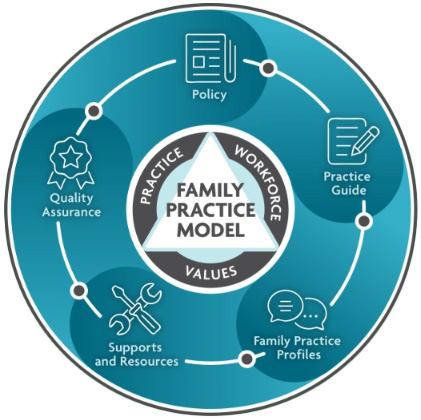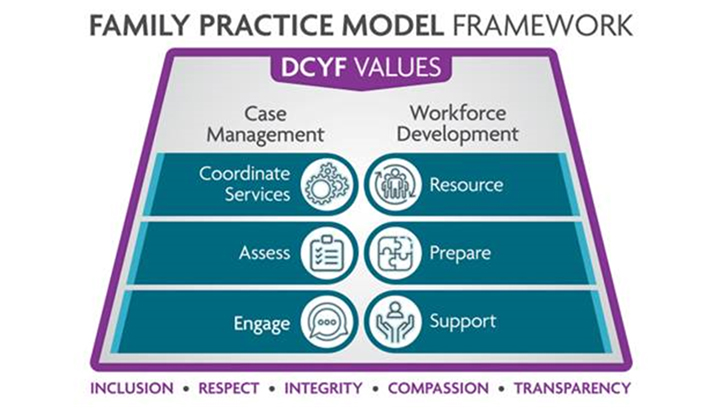Family Practice Model
Family Practice Model
The Family Practice Model (FPM) is a response to DCYF's Strategic Initiative to Improve the Quality and Intention of Practice. The FPM is an organizing framework that prepares case managers who work with at-risk children and families and provides coaching for staff in a learning culture. The FPM supports a professional environment that recognizes that staff learn and grow their case management practice skills over time.
The FPM can be considered a “one-stop-shop” for staff by bundling essential guidance by service area (an area of practice), streamlining it in one location for increased accessibility.

The five elements of the Family Practice Model
Policy – Practice intent and goals of practice, which are based in agency values.
Practice Guide – Procedures that outline requirements and definition of common practice.
Family Practice Profile – Behavior description and examples of how workers interact with families using values-based case management: engage, assess, and plan.
Supports & Resources – Training, coaching, professional development, and personal support to prepare workers. QUALITY ASSURANCE – Impacts of FPM to support, prepare, and resource workers in a learning environment.
Family Practice Profiles (FPPs) provide guidance to describe behaviors that demonstrate values-based case management practice by service area. The profiles operationalize agency values in a way that promotes consistency of practice across all regions. The FPPs include examples of best and developmental practice for each service area as well as practice examples that highlight Indian Child Welfare active efforts.
Family Practice Model Framework
The Family Practice Model Framework (completed July 2022) is used to communicate practice standards through case management activities described by how staff engage, assess, and plan with families. The framework indicates an equal pledge to support a learning environment where workers are supported through professional development while interacting with families.
The framework represents a methodical and reliable way to prepare and support staff to adapt to practice changes while promoting values-based case management practice.

The FPM framework was created using a co-design method to produce a balanced commitment to operationalize the agency’s values. The design team consists of regional staff who meet all over the state hosting co-design sessions where they gather expertise of their peers. Co-designing guidance for staff by staff provides relevant, practical, and useful support because it is based on experiences of their peers. The commitment to continue using the co-design method to create practice profiles is unwavering.
DCYF Values
The FPM team engaged with staff to define the agency values, and outlined ways that each value is demonstrated through case management practice as well as how the agency uses the values to impact and improve staff working environments.

Inclusion – Seek and actively engage, encourage, and prioritize equitable participation within a family centered approach.
Respect – Value and honor another person for who they are, showing regard for their culture, rights, and traditions.
Compassion – The act of being respectful, empathetic, and encouraging to those we work and interact with.
Integrity – Self awareness and being accountable, responsible, truthful, and actions are consistent with values.
Transparency – Interact in a way that everyone sees how and why actions are performed through open communication and accountability.
